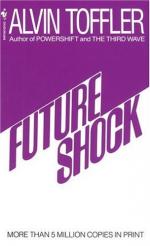|
This section contains 8,823 words (approx. 30 pages at 300 words per page) |

|
SOURCE: McCracken, Samuel. “Apocalyptic Thinking.” Commentary 52, no. 4 (October 1971): 61-70.
In the following essay, McCracken describes Future Shock as a work of “pop futurism” and points out a variety of weaknesses in Toffler's arguments.
For an observer with a moderately developed sense of history, and the most moderate standard of excellence, it can be an unbearable suspicion that his time and space may turn out to have been absolutely undistinguished. Dr. Pangloss and G. F. Babbitt warded off the dread thought by assuring themselves that it was the best of all possible worlds; Victorian optimists warded it off with the more modest notion of progress. The second of these views—with an obligatory codicil about how much there is to be done—lives on, but not among intellectuals, who are more likely to claim a sort of anti-distinction for the age and to take authentic delight in living in...
|
This section contains 8,823 words (approx. 30 pages at 300 words per page) |

|


